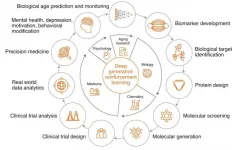(Press-News.org) Access to legal cannabis stores is associated with a reduction in opioid related deaths in the United States, particularly those linked to synthetic opioids such as fentanyl, finds a study published by The BMJ today.
Opioids are 'morphine-type' drugs that relieve short-term (acute) pain and pain at the end of life. There is little evidence that they are helpful for long-term (chronic) pain, but they are often prescribed for this reason.
This has led to widespread misuse and a sharp rise in overdose deaths, particularly in the United States. In 2018, there were more than 46,000 fentanyl related deaths, representing over two thirds of all US opioid related deaths that year.
Some studies have suggested that increased access to cannabis stores - legally authorised to sell medical and recreational cannabis - may help to reduce opioid related deaths, but the evidence so far is mixed.
To explore this further, researchers examined relationships between medical and recreational cannabis stores (referred to as dispensaries) and opioid related deaths from 2014 to 2018.
Their findings are based on data for 812 counties within the 23 US states that allowed legal cannabis dispensaries to operate by the end of 2017.
Information on state level cannabis legislation was combined with county level data on licensed dispensaries and opioid related mortality rates.
After controlling for population characteristics and other potentially influential factors, the researchers found that counties with a higher number of active cannabis dispensaries were associated with reduced opioid related mortality rates.
According to this estimate, an increase from one to two dispensaries in a county was associated with an estimated 17% reduction in all opioid related mortality rates.
This association held for both medical and recreational dispensaries and appeared particularly strong for deaths associated with synthetic opioids other than methadone, with an estimated 21% reduction in mortality rates associated with an increase from one to two dispensaries.
An increase from two to three dispensaries was associated with a further 8.5% reduction in all opioid related mortality rates.
This study is the first to examine the association between active cannabis dispensary operations and opioid related mortality rates at the more fine grained county level.
However, the results are observational, so can't establish cause, and the researchers stress that while cannabis is generally thought to be less addictive than opioids, it still carries potential harms and public safety risks should not be ignored.
But they say their findings suggest "a potential association between increased prevalence of medical and recreational cannabis dispensaries and reduced opioid related mortality rates."
And they call for "a greater understanding of the impact of cannabis legalization on opioid misuse and public health outcomes before policy makers can weigh the potential benefits against the harms of promoting cannabis legalization."
In a linked editorial, researchers argue that cannabis liberalization "cannot be regarded as a remedy to the opioid crisis until a robust evidence base is available."
Although some may interpret these findings as evidence supporting cannabis liberalization to address the opioid crisis, they point out that "such conclusions are currently premature without evidence of causality."
Further experimental studies including individual level data of those with use of prescription opioids and illicit opioids "would inform a more nuanced understanding of the substitution between opioids and cannabis," they conclude.
INFORMATION:
Peer reviewed? Yes (research); No (linked editorial)
Evidence type: Observational; Opinion
Subjects: Legal cannabis stores
A new study has shown that, while there is limited evidence for overall increased mortality in patients with atopic eczema, those with severe atopic eczema may have a greater risk of dying from several health issues compared with those without eczema, according to a new study in the Journal of Allergy and Clinical Immunology.
The research team, led by the London School of Hygiene & Tropical Medicine (LSHTM) and funded by the Wellcome Trust, compared the risk of dying in over 500,000 adults with atopic eczema with more than 2.5 million without eczema. Patients with severe atopic eczema had a 62% higher risk of dying compared to ...
27th of January, Wednesday, Hong Kong - Deep Longevity, a fully-owned subsidiary of Regent Pacific (HKEX: 0575), specializing in the development and the application of next-generation artificial intelligence (AI) for aging and longevity research, today announced the publication of an article in END ...
The thought of eating insects is stomach turning for many, but new Edith Cowan University (ECU) research is shedding light on allergy causing proteins which could pose serious health risks for those suffering from shellfish allergy.
The research, published in the journal Food Chemistry, identified 20 proteins found in cricket food products which could cause serious allergic reactions.
The project was led by Professor Michelle Colgrave from ECU's School of Science and the CSIRO.
Professor Colgrave said crickets and other insects could be the key to feeding ...
DALLAS (January 26, 2021) - Many people believe that they can't change their brains, or that their brain health will inevitably decline as they age. But the Strategic Memory Advanced Reasoning Tactics (SMART) training protocol, created by researchers and clinicians at the Center for BrainHealth®, has been demonstrated over the past two decades to improve cognitive function and psychological well-being in laboratory participants. Recent research suggests that SMART can even make long-lasting improvements to people's brain health when given outside of the lab in short, informal training sessions.
A paper detailing these findings was recently published in Military Medicine. The research was a collaboration between Leanne R. Young, PhD, of Applied Research Associates, ...
The widespread use of cashless payments including credit cards, debit cards, and mobile apps has made transactions more convenient for consumers. However, results from previous research have shown that such cashless payments can increase consumers' spending on unhealthy food. "Why Do Cashless Payments Increase Unhealthy Consumption? The Decision-Risk Inattention Hypothesis," a newly published article in the Journal of the Association for Consumer Research, explains this phenomenon by showing how changes in bodily responses to cashless payments influence consumers responses.
Authors Joowon Park, Clarence Lee, and Manoj Thomas propose that cash and cashless payments elicit different levels of negative arousal when making shopping ...
The development of small hydropower dams is widespread throughout Brazil and elsewhere in the world, vastly overshadowing large hydropower projects. The proliferation of these smaller dams is a response to growing energy and security needs. Their expansion, however, threatens many of the remaining free-flowing rivers and biodiverse tropical regions of the world -- interrupting the migrations of freshwater fishes, on which millions of peoples' livelihoods depend.
A new University of Washington paper published Jan. 11 in Nature Sustainability quantifies these tradeoffs between hydroelectric generation capacity and the impacts on river connectivity ...
Popular folklore and anecdotal evidence suggest that people in a hypnotic or suggestible state can experience sensory hallucinations, such as perceiving sounds and sights that are not actually there. Reliable scientific evidence of these experiences, however, has been notoriously challenging to obtain because of their subjective nature.
New research published in the journal Psychological Science provides compelling evidence that hypnotic suggestions can help highly susceptible people "see" imaginary objects, equipping them with the missing details needed to solve an otherwise challenging visual puzzle.
"Hypnosis holds intriguing effects on human behavior," said Amir Raz, a researcher at McGill University and coauthor on the paper. "The careful, systematic study of hypnotic phenomena can ...
BUFFALO, N.Y. - A new study led by a University at Buffalo researcher has identified how specific communication among different brain regions, known as brain connectivity, can serve as a biomarker for attention deficit hyperactivity disorder (ADHD).
The research relied on a deep architecture using machine-learning classifiers to identify with 99% accuracy those adults who had received a childhood diagnosis of ADHD many years earlier.
"This suggests that brain connectivity is a stable biomarker for ADHD, at least into childhood, even when an individual's ...
Amid a sharp economic downturn in 2008, police departments around the United States experienced budget shortfalls that required them to enact cutbacks. A new study examined the effects on crime of budget shortfalls in two New Jersey cities--one of which laid off more than 10 percent of its police force while the other averted layoffs. The study found that the police layoffs were associated with significant increases in overall crime, violent crime, and property crime.
The study, by researchers at John Jay College of Criminal Justice and Rutgers University, appears in Justice Evaluation Journal, a publication of the Academy of Criminal Justice Sciences.
"Our study suggests that sudden and drastic reductions in the size of a police force via layoffs of police officers ...
A new machine learning algorithm based on mammograms can estimate the risk of breast cancer in women more accurately than current risk models, according to a study from Adam Yala and colleagues. The algorithm, which was tested with datasets from three large hospitals located worldwide, could help clinicians design guidelines for breast cancer screening that meet the need for early detection while reducing false-positives, test costs, and other issues associated with overscreening. Mammograms are the most common method to screen for breast cancer, as more than 39 million procedures are performed in the U.S. annually. However, their widespread adoption has not gone without ...


